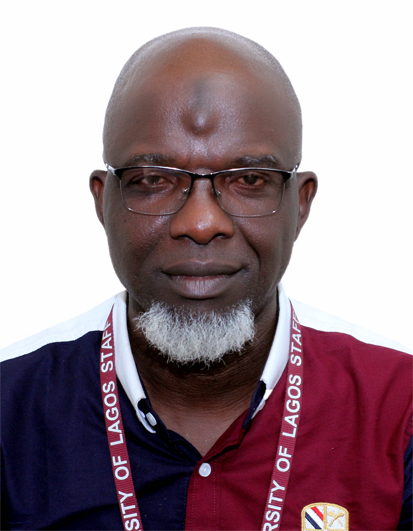A Professor of Genetics in the Department of Cell Biology and Genetics, University of Lagos, Nigeria with area of specialization as Genetics. A resourceful, hard-working and dedicated biologist with an outstanding academic background, a good publication record and significant experience in teaching, research and administration at tertiary level of education. A member of research centres focusing on genomics, conservation and environmental management with records of research grants managed in diverse areas of biological sciences.
His area of research includes but not limited to Genetics, Cytogenetics, Genotoxicology, Molecular Genetics, Conservation and Forensics. He has over seventy - six (76) publications, contributed as co-author to two (2) books and has attended over 120 conferences and workshops where he presented papers and posters as researcher or keynote speaker. His publications have shown tremendous contributions to knowledge in Human Genetics, Medical Genetics, Conservation Biology, Forensics and Toxicology studies in Nigeria.
Professor Adekoya understands the need for multidisciplinary collaborations and therefore has been involved as a leader or member of teams in grants and fellowships in various areas from diverse fields of Genetics, Conservation Biology, Agriculture, Food security and Forensic biology. He has won grants from Agricultural Research Council of Nigeria on Yellowing Diseases of Coconut Palms in Nigeria as well as on Germplasm Conservation of Culturable shell and fin fishes in the Nigerian Coastal Waters. He is also an award winner of University of Lagos Central Research Committee grants for both mini and major grants on Goats, Indigenous Chickens and Forensic Biology. He equally won a grant on Bioinformatics in Lagos State Research and Innovation Council on COVID and National Research Fund (NRF), TETfund on Cancer research.
He has effectively supervised nine (9) doctoral Thesis in Cytogenetics, Forensic Genetics, Human Genetics, Genetic Diversity, Medical Genetics and Population Genetics. He is a Fellow of Institute of Security, Nigeria and a member of many professional academic societies and associations locally and internationally. Some of which are Genetics Society of Nigeria (GSN), Genetic Toxicology Association of Nigeria (GTAN), TETfund Center of Excellence in Biodiversity Conservation and Environmental Management (TCEBCEM), Center for Genomics of Non-Communicable Diseases and Personalized Healthcare (CGNPH), World Poultry Society (WPS), Society for Environmental Toxicology and Chemistry (SETAC), Belgium and Center for Theology and Natural Sciences (CTNS), USA among others.
Professor Khalid Olajide Adekoya current research centers on Multiplex PCR potential of Short Tandem Repeats (STRs) with the hope of generating DNA data bank for the Nigerian Society for use in security, curbing crimes and a good reference material for efficient criminal justice prosecution.
In the application of forensic genetics, the potentials of DNA data bank for Nigerian security and criminal justice administration was provided by the attempts of his team to use recent molecular techniques of multiplex PCR and short tandem repeats among ethnic nationalities in Nigeria.
The efforts in the determination of allelic frequencies and discriminatory genes amongst the three major tribes in Nigeria observed for the first time three (3) novel genes that differentiated the Hausa population from other ethnic groups. There were also specific minutae qualities
useful for discriminations amongst Igbos as well as loci of genes suitable for use in identification, discrimination and forensic applications in the Yoruba ethnic groups. These new alleles have been confirmed to be highly polymorphic and will be informative for the purpose of forensic testing in Nigeria.
He is a primary mentor to Ahmed Rahamon Ademolu on the EN-RTP project that explores mechanisms of viral attenuation and associated physiological weaknesses and HIV elite controllers and slow progressors in Nigeria and South Africa. The project is forward looking towards HIV vaccine development. He has contributed on mechanism of viral suppression among HIV elite controllers and long-term nonprogressors among PLHIV in Nigeria and identified research gaps that will contribute to a better understanding of HIV controllers among PLHI


